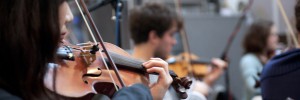University degrees: Postgraduate
Course length: 2 years
The NFTS trains composers in both live and synth/sample-based music for the moving image in a production context closely modelled on industry working practices.
The NFTS trains composers in both live and synth/sample-based music for the moving image in a production context closely modelled on industry working practices.
Graduate Dario Marianelli won the Oscar for Best Music (Original Score) for Atonement and was BAFTA-nominated this year for Darkest Hour.
Students will compose for a wide variety of audio visual material and collaborate closely with those in other specialisms to produce several films – with all production costs met by the School. In particular, composers work closely with other students in Editing and Sound Post Production, increasing their understanding of the relationship between audio and moving images.
We offer a flexible curriculum adaptable to our students’ individual needs, with individual music suites, recording sessions with live musicians and education in business, legal and professional skills. Composing graduates are qualified to take on all forms of work in film and television as well as productions in multimedia and interactive programming.
All NFTS students can attend the School’s masterclasses programme, with recent guests including Martin McDonagh (In Bruges, Three Billboards Outside Ebbing, Missouri), Phoebe Waller-Bridge (Fleabag, Killing Eve), Asif Kapadia (Amy, Senna, Diego Maradona), Lynne Ramsay (You Were Never Really Here, We Need to Talk About Kevin), Louis Theroux, and M Night Shyamalan (The Sixth Sense, Glass).
This course is industry recognised by ScreenSkills, the industry-led skills body for the UK’s screen-based industries, and carries the ScreenSkills Select quality-mark which indicates courses best suited to prepare students for a career in the screen industries.
In year one, students are taught the techniques and contexts which inform writing music for the screen. It starts with an intensive process during which students compose to a variety of exercises, each one chosen to focus on a particular aspect of film composition. Further exercises concentrate on scoring for live instruments, the combination of live and electro-acoustic elements and the integration a limited range of sound design into film scores. Students will also work on projects generated by other students at the NFTS and participate in visits from industry professionals.
In year two, students’ activities will be dominated primarily by films and other projects working with students from across the School. However, lectures, seminars and occasional workshops will be provided to clarify and expand issues arising from those projects.
